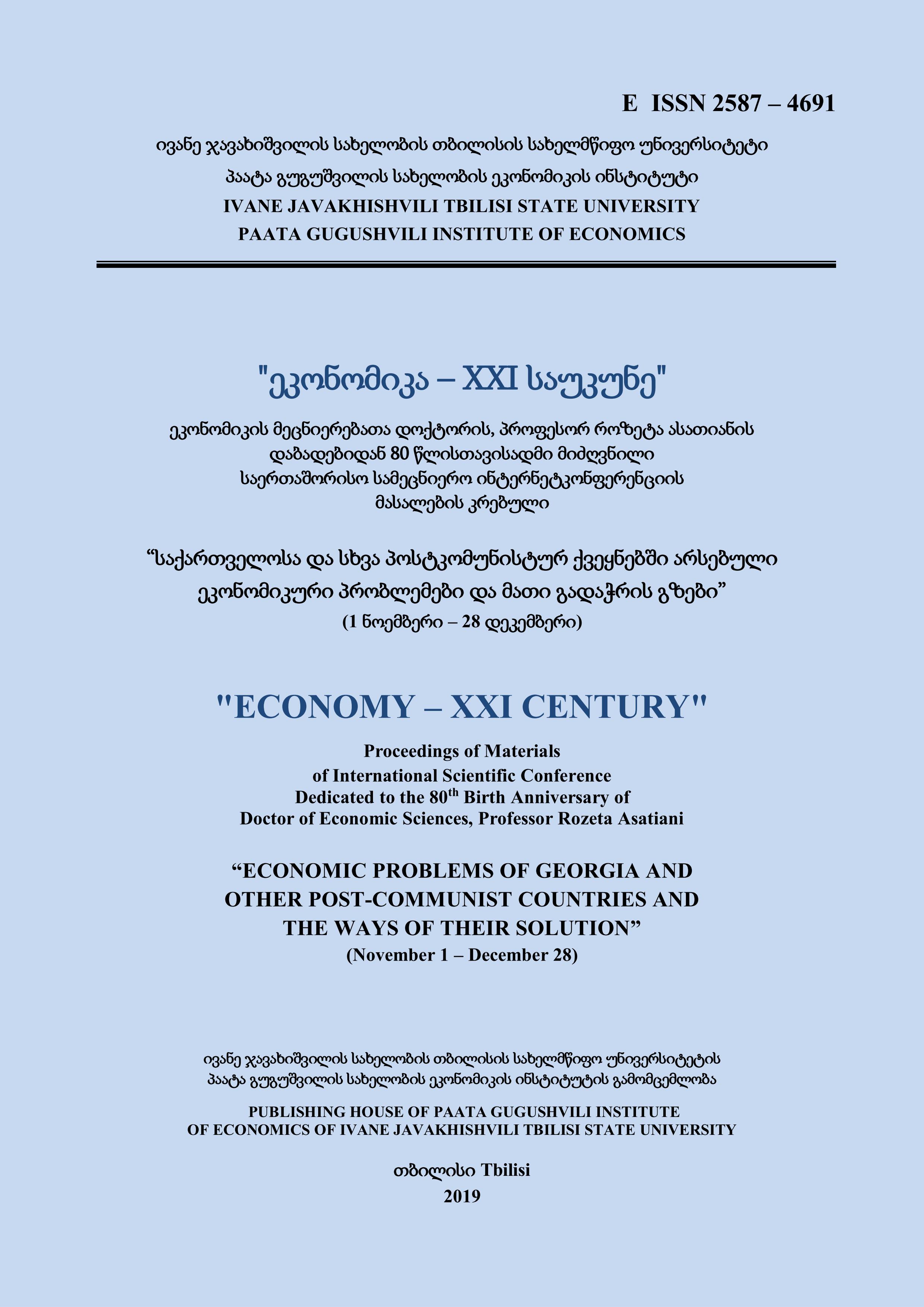О НЕКОТОРЫХ ВЫЗОВАХ ФОРМИРОВАНИЯ ЭКОНОМИЧЕСКОЙ ПОЛИТИКИ И ОПЫТ ПОСТКОММУНИСТИЧЕСКОЙ ГРУЗИИ
Аннотация
Статья предлагает типологию неэкономической политики. Опыт посткоммунистической Грузии иллюстрирует примеры, когда реализованная правительствами неэкономическая политика отрицательно отражалась на экономическое развитие страны. Основной вызов заключается в сближении экономической политики к экономической науке.
Библиографические ссылки
Åslund A., 2002. Building Capitalism. The Transformation of the Former Soviet Bloc. New York, Cambridge University Press.
Åslund A., 2007. How Capitalism Was Built. The Transformation of Central and Eastern Europe, Russia, and Central Asia. New York, Cambridge University Press.
Åslund A., 2013. How Capitalism Was Built. The Transformation of Central and Eastern Europe, Russia, the Caucasus, and Central Asia. New York, Cambridge University Press.
Balcerowicz L., 1995. Socialism, Capitalism, Transformation. Budapest, CEU.
Buchanan J. M., Tullock G., 1962. The Calculus of Consent: Logical Foundations of Constitutional Democracy. Ann Arbor, University of Michigan Press, <http://www.econlib.org/library/Buchanan/buchCv3.html>.
Cliffe M., 2019. What Economists Still Need to Learn. Project Syndicate, September 9, <https://www.project-syndicate.org/commentary/macroeconomic-models-three-lessons-2008-crisis-by-mark-cliffe-2019-09?utm_source=Project+Syndicate+Newsletter&utm_campaign=aabf9c90ac-sunday_newsletter_15_9_2019&utm_medium=email&utm_term=0_73bad5b7d8-aabf9c90ac-93567601&mc_cid=aabf9c90ac&mc_eid=e9fb6cbcc0>.
Frye T., 2010. Building States and Markets After Communism: The Perils of Polarized Democracy. Cambridge, Cambridge University Press.
Hare P., Turley G., eds., 2013. Handbook of the Economics and Political Economy of Transition. London, Routledge.
Krugman P., 1996. A Country Is Not a Company. Harvard Business Review, January–February, <https://hbr.org/1996/01/a-country-is-not-a-company>.
Lagarde C., 2017. Central Banking and Fintech—A Brave New World? IMF Communications Department, September 29, <http://www.imf.org/en/News/Articles/2017/09/28/sp092917-central-banking-and-fintech-a-brave-new-world?cid=em-COM-123-35955>.
Papava V., 2011. On the First-Generation Post-Communist Reforms of Georgia’s Economy (A Retrospective Analysis). The Caucasus & Globalization, Vol. 5, Issue 3-4.
Papava V., 2012. Economic Reforms in Post-Communist Georgia: Twenty Years After. New York, Nova Science Publishers.
Papava V., 2013. Economic Achievements of Postrevolutionary Georgia: Myths and Reality. Problems of Economic Transition, Vol. 56, No. 2.
Papava V., 2017a. Features Of Governmental ‘Business’ In Post-Soviet Georgia. Eurasia Review, June 27, <https://www.eurasiareview.com/27062017-features-of-governmental-business-in-post-soviet-georgia-oped/>.
Papava V., 2017b. Primitivism as a Trait of Georgia’s Modern Economic Policy. The Central Asia-Caucasus Analyst, May 4, <http://cacianalyst.org/publications/analytical-articles/item/13444-primitivism-as-a-trait-of-georgia%E2%80%99s-modern-economic-policy.html>.
Papava V., 2018a. Georgia’s Economy in a “Tourist Trap”. Rondeli Blog, July 25, <https://www.gfsis.org/blog/view/854>.
Papava V., 2018b. Why Georgia Needs Economists. Rondeli Blog, October 12, <https://www.gfsis.org/blog/view/871>.
Papava V., 2019. On the Non-Economic Policy and the Post-Communist Experience of Georgia. European Journal of Economic Studies, Vol. 8, No. 2, <http://ejournal2.com/journals_n/1573764064.pdf>.
Papava V., Taphladze T., 2015. Pseudo-Libertarianism in Post-Revolutionary Georgia. Bulletin of the Georgian National Academy of Sciences, Vol. 9, No. 2.
Roland G., 2000. Transition and Economics: Politics, Markets, and Firms. Cambridge, The MIT Press.
Roland G., 2014. Transition in Historical Perspective. In The Great Rebirth. Lessons from the Victory of Capitalism over Communism. Ed. by A. Åslund, S. Djankov. Washington, DC., Peterson Institute for International Economics.
Shiller R. J., 2018. The Old Allure of New Money. Project Syndicate, May 21, <https://www.project-syndicate.org/commentary/cryptocurrencies-scientific-narrative-by-robert-j-shiller-2018-05?utm_source=Project+Syndicate+Newsletter&utm_campaign=c4c50cbed2-sunday_newsletter_27_5_2018&utm_medium=email&utm_term=0_73bad5b7d8-c4c50cbed2-93567601>.
Udensiva-Brenner M., 2010. Kakha Bendukidze Analyzes Georgia’s Economic Strategy: How Georgia Handled Its Economy After the War and the Economic Crisis. Harriman Institute, April 7, <https://harriman.columbia.edu/event/kakha-bendukidze-analyzes-georgia%E2%80%99s-economic-strategy-how-georgia-handled-its-economy-after>.
Waal T. de, 2011. Georgia’s Choices: Charting a Future in Uncertain Times. Washington, D.C., Carnegie Endowment, <https://carnegieendowment.org/files/georgias_choices.pdf>.
Ролан Ж., 2012. Экономика переходного периода. Политика, рынки, фирмы. Москва, Издательский дом Высшей школы экономики.
Стиглиц Дж., 2010. Экономисты виноваты в кризисе, но есть шанс исправить дело. Институт проблем предпринимательства, 5 окртября, <https://www.ippnou.ru/article.php?idarticle=008769>.

